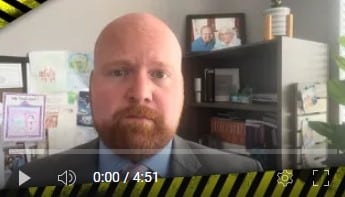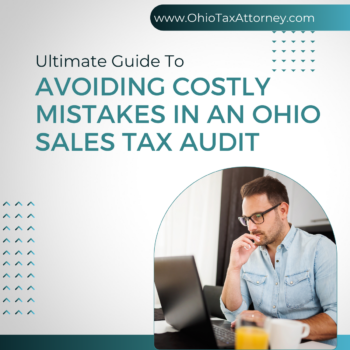Ohio Attorney General Collections: Guide to Resolving Ohio Tax Debt
- Posted by Joshua Sells
- On August 10, 2023
- ohio attorney general collections, ohio offer in compromise, ohio sales tax, Ohio Tax Attorney, ohio tax debt, ohio tax settlement
Are you a taxpayer in Ohio who finds themselves overwhelmed by state tax debt and struggling to regain control? Has the Ohio Attorney General’s Office or their designated “Special Counsel” reached out to you regarding your back taxes? If so, you’re not alone. Many Ohioans face similar challenges and may feel lost or uncertain about their options for resolving their back taxes. In this guide, we will explore the Ohio Attorney General Collections process, provide valuable insights and tips, and ultimately help you navigate your state tax debt situation, whether it is personal tax, sales tax, or commercial activity tax (CAT).
Introduction: Exploring the Ohio Attorney General Collections Process
Dealing with Ohio tax debt can be very stressful, and when the Ohio Attorney General Collections process enters the picture, it can feel even more overwhelming. Do not allow yourself to feel defeated. When it comes to Ohio Attorney General collections you have options. You can take control of the situation and find a solution that will work for you.
The Ohio Attorney General Collections process is designed to ensure that taxpayers fulfill their obligation to pay their back taxes. It involves the Ohio Attorney General’s Office working with the Ohio Department of Taxation to collect overdue taxes. The Department of Taxation actually doesn’t have collection power (only when the bill is initially due – not when it has been certified to the AG for past-due collection). The Ohio AG has limited staff, so they will outsource most of their collection work. The Special Counsel, a third-party debt collection agency, plays a critical role in this process. Their primary responsibility is to assist in the collection efforts, provide guidance to taxpayers, and explore alternative options for resolving their debt. Keep in mind that the Special Counsel can still use all means necessary to collect the debt, including garnishing wages and bank accounts.
Keep in mind, the Ohio Special Counsel is merely just a debt collector and has to follow federal and state debt collection practices.
Understanding the Ohio Attorney General Collections Process
Stage 1: Notice of Collection from Ohio Attorney General Collections
The first stage in the Ohio Attorney General Collections process is the receipt of a Notice of Collection. This notice serves as a communication informing you that the Ohio Attorney General’s Office is now responsible for collecting your back taxes. You want to promptly respond to this notice. Ignoring or neglecting this notice will only cause you more stress and more penalties and interest.
Upon receiving the Notice of Collection, take the time to look over all of the information that is provided. It will detail the amount owed, any penalties or interest accrued, and provide instructions on how to proceed. If you believe that there are discrepancies based on what you believe you owe, take the time to go through your records and compare it to what you have. Remember, addressing the situation promptly is key to preventing further complications.
If this is ignored (as it often is in our experience), then the state will proceed to filing a tax lien against you and starting the collection process.
Stage 2: Evaluating Your Options with the Ohio Attorney General Collections
Once you have received the Notice of Collection, it’s time to evaluate your options for resolving your debt. The Ohio Attorney General’s Office understands that not everyone can immediately pay their outstanding taxes in full. Remember they do have a job to do, which is collect the taxes owed but they are willing to work out a solution that is favorable for both parties. Being kind, patient, and understanding goes a long way when dealing with the Ohio Attorney General collections process.
One potential option to consider is entering into a payment plan. This will allow you to take the amount of taxes owed and divide that out into a monthly payment plan to help you pay off the tax debt gradually over time.
Typically, however, these payment plans will max out at 24 months. If a 24 month payment plan would be more than you can financially afford you can submit full financials such as bank statements, tax returns, and income statements to get a reduced payment amount.
Stage 3: Negotiating a Payment Plan with the Ohio Attorney General Collections
Negotiating a payment plan is a crucial step in the Ohio Attorney General Collections process, as it allows you to establish a clear path towards debt resolution. You want to be prepared by going through your current financial situation to see what you can afford.
This self-evaluation will give you a better understanding of what you can feasibly commit to, helping you negotiate a payment plan that aligns with your capabilities.
When communicating with the Ohio Attorney General’s Office, be very transparent about your financial situation. Demonstrating an attitude of willingness to do whatever is necessary to get this tax debt resolved will go a long way with them.
We had a client who only had social security income so he was on a very tight budget. After submitting the right financial documentation we were able to establish a $50 a month payment plan with the Ohio Attorney General’s office.
We recommend getting a formal agreement in writing of the payment plan. Most importantly do not default your payment plan.
Stage 4: Establishing a Payment Plan with the Ohio Attorney General Collections
Once you and the Ohio AG have reached an agreement on a payment plan, ensure that you carefully review its terms and conditions. Pay close attention to the monthly payment amounts, the duration of the plan, and any interest or penalties that may apply.
Also, when you have less than a year left on the payment plan, call the AG and see if you can do an “AGI Waiver” lump sum payoff. Many times, they will waive a portion of the remaining balance if you just pay it off. You can also certainly try this instead of a payment plan, but be prepared to pay the large lump sum payment upfront!
Remember, it is crucial to make your scheduled payments on time each month. Consistency and reliability are key to successfully completing your payment plan. By doing so, you will gradually reduce your debt and alleviate the financial stress associated with it.
Stage 5: Seeking Professional Assistance from an Ohio Tax Attorney
While entering into a payment plan is a viable option for many taxpayers, there may be cases where additional assistance is required. If you find yourself struggling to negotiate with the Ohio Attorney General’s Office or face unexpected financial setbacks, seeking professional assistance is wise.
An Ohio tax attorney can advise if the debt is even valid or if you are a good candidate for other resolution options – like the Ohio Offer in Compromise. They can help you evaluate your financial situation, explore alternative debt management strategies, and represent your interests during negotiations. By enlisting their expertise, you can gain peace of mind and increase your chances of finding the most suitable solution for your back tax situation.
An Ohio Tax Attorney can also help you evaluate whether the debt is valid or not. Many times, especially for sales tax and CAT, the tax debt is not valid and needs to be closed out retroactively with the Department of Taxation. Additionally, under some limited circumstances, you may qualify for an Ohio offer in compromise to settle the back tax instead of doing a payment plan.
Conclusion: Taking Control of Your Financial Future
Resolving state of Ohio back tax is stressful.But having an understanding of the Ohio Attorney General Collections process will help you get through it. By using the steps outlined in this guide, you can navigate your state of Ohio back tax case with confidence. And remember, J. M. Sells Law is just a phone call away if you are unsure!
If you need a tax expert to help guide you through this process call us today at 330-331-7611 or submit a free case analysis request.
Disclaimer: This blog post is for informational purposes only and should not be considered as legal, financial, or tax advice. Consult with a qualified professional for personalized assistance.


